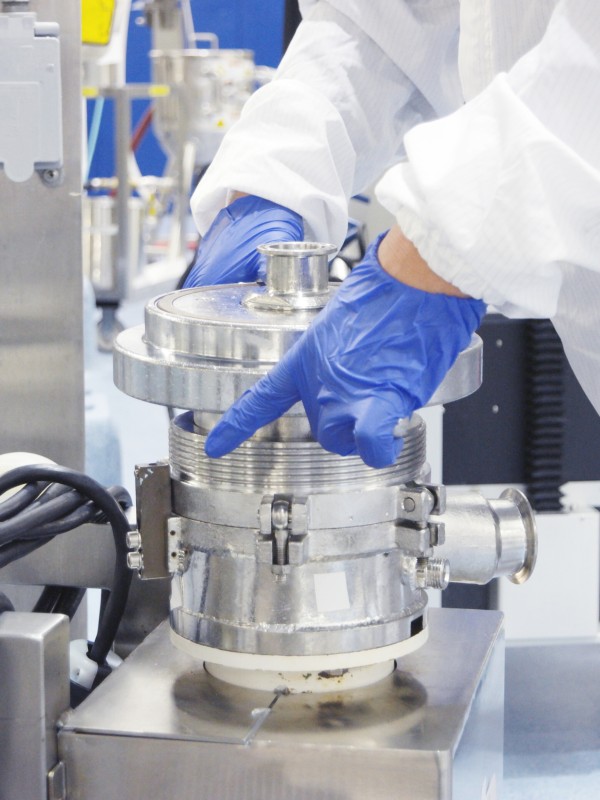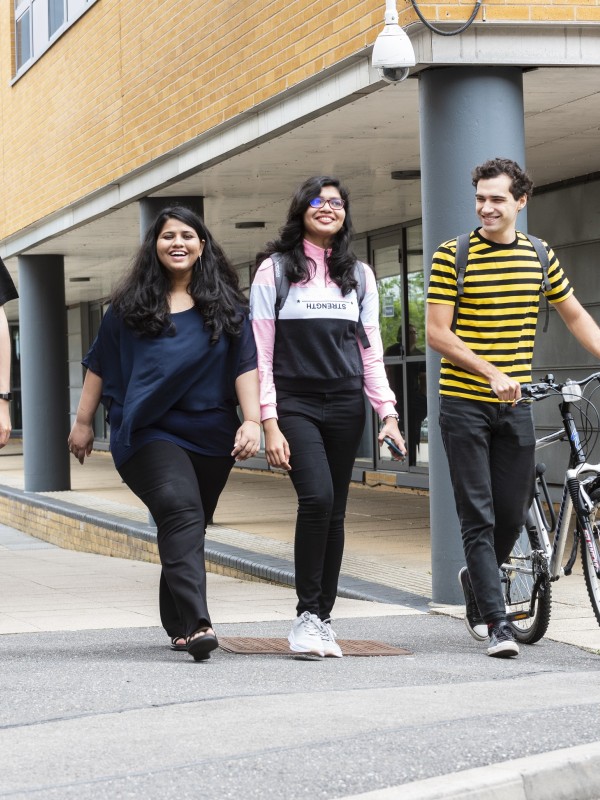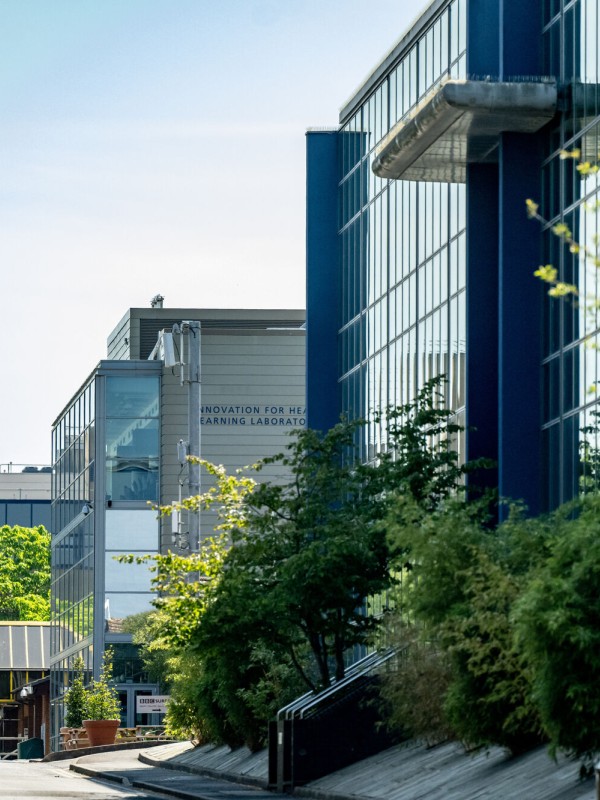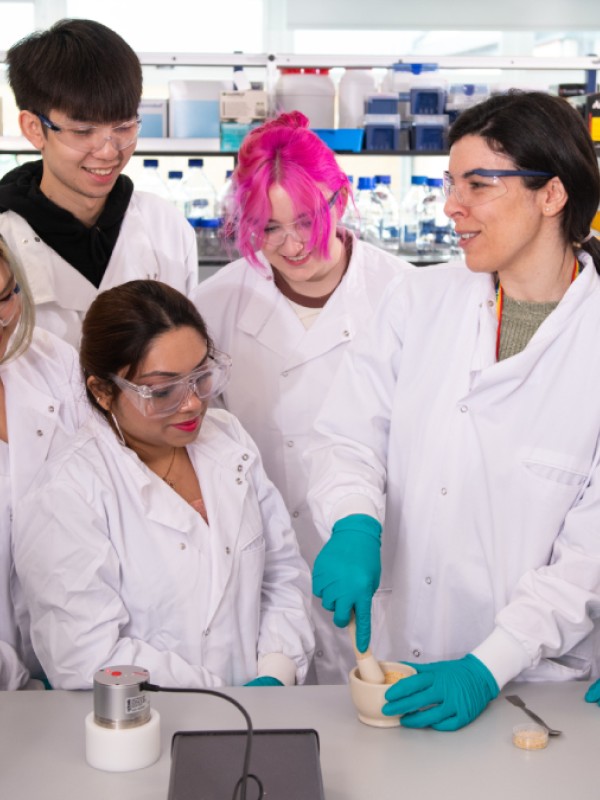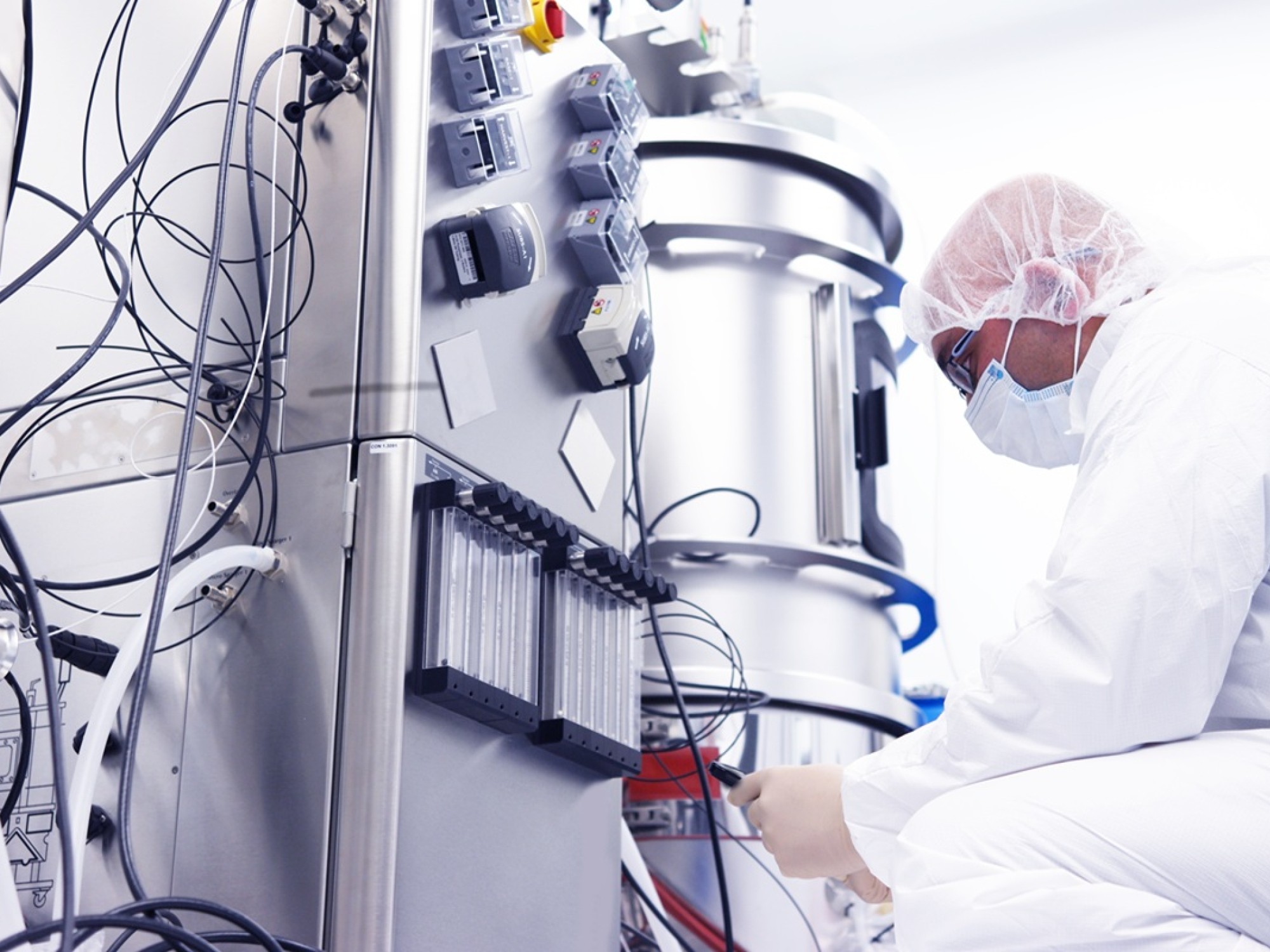
- Biotechnology
MSc — 2026 entry Biotechnology
On our Biotechnology MSc, you’ll learn how biological processes can be harnessed to create life-changing products and services. From healthcare to agriculture to renewable energy, biotechnology can change the world for the better. Our course will give you the knowledge and skills to make a difference in this exciting and rapidly growing sector.
4,138+ people have created a bespoke digital prospectus
Why choose
this course?
- Gain an in-depth understanding of the biotechnology industry, from applications of biotechnology in the lab to commercialisation in business and non-conventional uses of biotech in the future.
- Learn from academics across the University who are experts in biosciences, chemistry and chemical engineering, business, sustainability, and people-centred AI.
- Access our multimillion-pound biosciences and chemical engineering facilities, including labs with bioanalytical equipment and bioreactors.
- Benefit from Surrey’s well-established advancements in biotechnology research, including the development of new bioprocesses for antibiotics and vaccines, and the bioremediation of polluted water and soil.
- Explore case studies presented by industry experts and develop skills that are in high demand by leading biotech companies – and take advantage of our proximity to the ‘golden triangle’ of biotech hubs once you graduate.
Statistics
100%
Of our biosciences masters graduates are in employment or further study within 15 months of graduating (Graduate Outcomes 2025, HESA)
What you will study
On this course, you’ll gain a comprehensive overview of biotechnology across four modules covering:
- The use of microorganisms and cell lines as ‘cell factories’, and the move from exploring biological principles to applying them in industry
- How biotechnology is used in business and how it’s commercialised
- How bioprocessing and bioprocesses are transferred from the lab to industry
- The current biotechnology landscape, and new and future trends.
In your first semester, you’ll examine early applications of biotechnology in the biopharmaceutical and biotechnological industries. You’ll look at essential tools such as principles of cell cultivation, biochemistry and metabolism, genetic manipulation, and synthetic biology. And you’ll explore the field of biotechnology that develops solutions using computational biology approaches, including AI and machine learning.
You’ll study and examine the legal and regulatory features of industrial biotechnology, from management and intellectual property to government approval for trials and ethical considerations. Best of all, you’ll get an insight into the commercial landscape of biotech from industry guest speakers.
In your second semester, you’ll learn how biotechnology can be harnessed in the lab and scaled up for industry by applying chemical and engineering principles to the study and design of cell and enzyme bioprocesses, bioremediation and depollution, precision fermentation and much more.
You’ll then look to future and non-conventional uses of biotech, with insights from guest speakers. Topics include AI in drug discovery; machine learning for bioprocess optimisation; sustainable (bio)chemistry; enzyme and protein engineering; biohacking; and forensic applications.
You’ll also complete a research project on a topic of your choice. We’ll match your interests with the expertise of our researchers, ensuring you get the best support.
Research groups
You’ll be invited to join research groups in our School of Biosciences, including the Section of Molecular and Systems Biology and the Section of Bacteriology. You’ll participate in meetings to discuss research topics, findings and publications, and attend seminars and workshops. These are a great opportunity to familiarise yourself with current research and connect with researchers and experts in the field.
One Health, One Medicine
Our Faculty of Health and Medical Sciences implements a ‘One Health, One Medicine’ approach, which combines research excellence from our five schools to sustainably improve human and animal health. As a student of this course, you will be able to take advantage of our expertise in this area, in which biotechnology plays a key role. You may get the opportunity to network with our partners and attend guest talks by entrepreneurs within the biotech industry, whose work aligns with the One Health, One Medicine ethos.
Facilities
You’ll have access to fully equipped research and teaching facilities in our School of Biosciences and our School of Chemistry and Chemical Engineering.
The structure of our programmes follows clear educational aims that are tailored to each programme. These are all outlined in the programme specifications which include further details such as the learning outcomes:
Modules
Modules listed are indicative, reflecting the information available at the time of publication. Modules are subject to teaching availability, student demand and/or class size caps.
The University operates a credit framework for all taught programmes based on a 15-credit tariff, meaning all modules are comprised of multiples of 15 credits.
Course options
Year 1
Semester 1
Compulsory
The module is directed to the study of large-scale bioprocessing and bioprocesses, from foundations to real industrial cases. The module shows how the principles studied in the previous module are applied in scales typical of pilot plant or industry, in particular the pharmaceutical, food, and chemical industries.
View full module detailsThe module is directed to the discussion and analysis of the technical aspects of industrial cases and their administrative, legal, and regulatory characteristics.
View full module detailsSemester 2
Compulsory
Overview: Applications of Biotechnology in biopharmaceutical and biotechnological industries. The module provides a description and demonstration of how the application of the principles of microbial and biochemical sciences can be used in the discovery, production, and manufacture of commercially important products for the pharmaceutical, food, and chemical industries, with examples and case studies and an experimental section. The principles of genetic and physiological deregulation and overexpression of metabolic products that are discussed in the module build upon the analysis of metabolic pathways (studied at UG level Biochemistry and Metabolism modules) and the study of microbial diversity, metabolism and function (studied at UG level in Microbiology modules). Complementary concepts would have been covered at UG level in modules discussing systems biology, genomics, etc. The principles of discovery and production of products of biopharmaceutical and biotechnological interest, such as food, bioenergy, and (bio)chemical industries are discussed applying a quantitative approach.
View full module detailsThe module is directed to the discussion of non-conventional Biotechnological processes and approaches, and the investigation of future directions for the area.
View full module detailsSemester 1 & 2
Core
In this module, the students will be able to demonstrate the understanding and knowledge of the basic principles they 've learnt in the modules. The students will work individually on in small groups in projects associated to existing research projects, or in projects proposed by them (subject to the available material and supervisor). In the first case, the students will have to choose a project from a given list of potential projects, and they will have to justify their choice. In the second case, the students will propose a subject and explain and justify the subject and its relevance.The research plan must be designed by the student, including a time-plan and the costs involved. They will have to perform a literature search on the subject under study, and propose a logical sequence of experiments to solve a scientific problem, making use of the materials, equipment and facilities available to them. The plan will be discussed the supervisors, who will oversee the execution of the project and will provide advise on the different experimental aspects involved. Finally, the students will report the results of their project in a dissertation.The objective of the module is to stimulate scientific learning and develop the student's ability to design, conduct and evaluate independent research. The project and the report must fulfil the standards required for an MSc degree, demonstrating critical analysis and scientific reasoning, based on the literature and the experimental work.
View full module detailsAcross academic years
Core
In this module, the students will be able to demonstrate the understanding and knowledge of the basic principles they 've learnt in the modules. The students will work individually on in small groups in projects associated to existing research projects, or in projects proposed by them (subject to the available material and supervisor). In the first case, the students will have to choose a project from a given list of potential projects, and they will have to justify their choice. In the second case, the students will propose a subject and explain and justify the subject and its relevance.The research plan must be designed by the student, including a time-plan and the costs involved. They will have to perform a literature search on the subject under study, and propose a logical sequence of experiments to solve a scientific problem, making use of the materials, equipment and facilities available to them. The plan will be discussed the supervisors, who will oversee the execution of the project and will provide advise on the different experimental aspects involved. Finally, the students will report the results of their project in a dissertation.The objective of the module is to stimulate scientific learning and develop the student's ability to design, conduct and evaluate independent research. The project and the report must fulfil the standards required for an MSc degree, demonstrating critical analysis and scientific reasoning, based on the literature and the experimental work.
View full module detailsOptional modules for Year 1 (full-time) - FHEQ Level 7
For further information regarding programme structure and module selection, please refer to the course catalogue.
Teaching and learning
You’ll be taught by lecturers who are active researchers, ensuring everything you learn is up-to-date and relevant to employers. These may include:
- Professor Claudio Avignone Rossa, a microbial biotechnologist with experience in bioprocess design for the production of biologically active compounds (antibiotics, recombinant proteins, pesticides, etc.) and for bioremediation of soil and water
- Professor Jhuma Sadhukhan, a leading expert in technoeconomic analysis and life cycle analysis for the development of sustainable bioprocesses
- Dr Oleksiy Klymenko, an expert in process design and modelling of bioprocesses
- Dr Joaquin Prada, an expert in machine learning and artificial intelligence for the design and analysis of processes of biological interest
- Dr Youngchan Kim, an expert in advanced biophysical methods and their applications in the analysis of biological processes.
- Lectures
- Group work
- Independent study
- Laboratory work
- Online learning
- Project work
- Research work
- Seminars
- Tutorials
- Workshops
Assessment
We use a variety of methods to assess you, including case studies, project writing, data analysis, and computer simulations.
General course information
Contact hours
Contact hours can vary across our modules. Full details of the contact hours for each module are available from the University of Surrey's module catalogue. See the modules section for more information.
Timetable
New students will receive their personalised timetable during Welcome Week. In later semesters, at least one week before the start of the semester.
Scheduled teaching can take place on any day of the week (Monday – Friday), with part-time classes normally scheduled for one or two days. Wednesday afternoons tend to be for sports and cultural activities.
View our code of practice for the scheduling of teaching and assessment (PDF) for more information.
Location
This course is based at Stag Hill campus. Stag Hill is the University's main campus and where the majority of our courses are taught.
We offer careers information, advice and guidance to all students whilst studying with us, which is extended to our alumni for three years after leaving the University.
The biotechnology industry is growing rapidly and there is high demand for skilled graduates, particularly in the UK which is a global leader in the field. As a graduate of this course, you’ll have the skills and knowledge to pursue a career in areas such as:
- Biotechnology
- Food technology
- Pharma
- Data analysis
- Environmental or scientific consulting
- Sustainable development
- Bioprocess engineering
- Research and development (R&D)
- Technical sales.
You may also wish to continue your studies by completing a PhD and preparing for a career in academia or industrial R&D.
100% of our biosciences masters graduates are in employment or further study within 15 months of graduating (Graduate Outcomes 2025, HESA).
Find out more about what you can do with a masters in biotechnology.
UK qualifications
A minimum of a 2:2 UK honours degree in a relevant discipline, such as biotechnology, biochemistry, biomedical sciences, biological sciences, chemistry, microbiology or pharmaceutical sciences.
Other relevant qualifications may be considered by the department on a case-by-case basis.
English language requirements
IELTS Academic: 6.5 overall with a minimum of 6.0 in each component.
These are the English language qualifications and levels that we can accept.
If you do not currently meet the level required for your programme, we offer intensive pre-sessional English language courses, designed to take you to the level of English ability and skill required for your studies here.
Recognition of prior learning
We recognise that many students enter their course with valuable knowledge and skills developed through a range of ways.
If this applies to you, the recognition of prior learning process may mean you can join a course without the formal entry requirements, or at a point appropriate to your previous learning and experience.
There are restrictions for some courses and fees may be payable for certain claims. Please contact the Admissions team with any queries.
Scholarships and bursaries
Discover what scholarships and bursaries are available to support your studies.
Fees per year
Explore UKCISA’s website for more information if you are unsure whether you are a UK or overseas student. View the list of fees for all postgraduate courses.
September 2026 - Full-time - 1 year
- UK
- £11,300
- Overseas
- £18,600
- These fees apply to the academic year 2026-27 only. Fees are reviewed annually, and tuition fees may increase for courses running over more than one year.
Payment schedule
- Students with Tuition Fee Loan: the Student Loans Company pay fees in line with their schedule (students on an unstructured self-paced part-time course are not eligible for a Tuition Fee Loan).
- Students without a Tuition Fee Loan: pay their fees either in full at the beginning of the programme or in two instalments as follows:
- 50% payable 10 days after the invoice date (expected to be October/November of each academic year)
- 50% in January of the same academic year.
- Students on part-time programmes where fees are paid on a modular basis: cannot pay fees by instalment.
- Sponsored students: must provide us with valid sponsorship information that covers the period of study.
The exact date(s) will be on invoices.
Funding
You may be able to borrow money to help pay your tuition fees and support you with your living costs. Find out more about postgraduate student finance.
Apply online
To apply online first select the course you'd like to apply for then log in.
Select your course
Choose the course option you wish to apply for.
Sign in
Create an account and sign into our application portal.
Please note that we may have to close applications before the stated deadline if we receive a high volume of suitable applications. We advise you to submit your application as soon as it is ready.
ApplyAdmissions information
Once you apply, you can expect to hear back from us within 14 days. This might be with a decision on your application or with a request for further information.
Our code of practice for postgraduate taught admissions explains how the Admissions team considers applications and admits students. Read our postgraduate applicant guidance for more information on applying.
About the University of Surrey
Need more information?
Contact our Admissions team or talk to a current University of Surrey student online.
Terms and conditions
When you accept an offer to study at the University of Surrey, you are agreeing to follow our policies and procedures, student regulations, and terms and conditions.
We provide these terms and conditions at offer stage and are shown again at registration. You will be asked to accept these terms and conditions when you accept the offer made to you.
View our generic registration terms and conditions (PDF) for the 2025/26 academic year, as a guide on what to expect.
Disclaimer
This online prospectus has been published in advance of the academic year to which it applies.
Whilst we have done everything possible to ensure this information is accurate, some changes may happen between publishing and the start of the course.
It is important to check this website for any updates before you apply for a course with us. Read our full disclaimer.
